常用介词短语总结
常用介词短语(全)
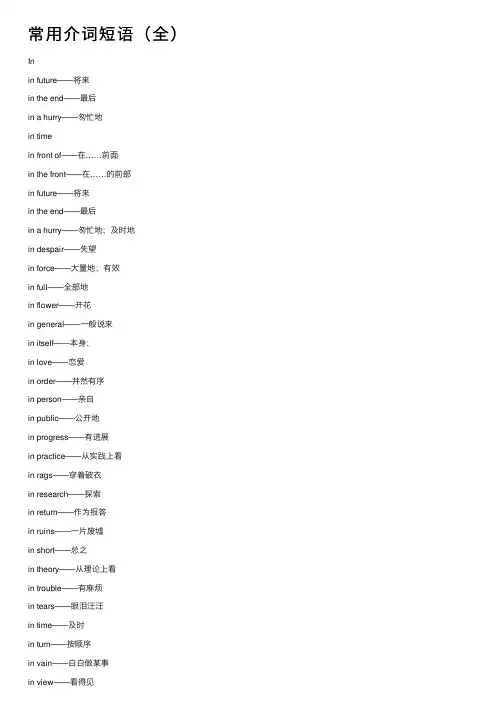
常⽤介词短语(全)Inin future——将来in the end——最后in a hurry——匆忙地in timein front of——在……前⾯in the front——在……的前部in future——将来in the end——最后in a hurry——匆忙地;及时地in despair——失望in force——⼤量地;有效in full——全部地in flower——开花in general——⼀般说来in itself——本⾝;in love——恋爱in order——井然有序in person——亲⾃in public——公开地in progress——有进展in practice——从实践上看in rags——穿着破⾐in research——探索in return——作为报答in ruins——⼀⽚废墟in short——总之in theory——从理论上看in trouble——有⿇烦in tears——眼泪汪汪in time——及时in turn——按顺序in vain——⽩⽩做某事in view——看得见join in——参与;lie in——存在于result in——导致share in——共享spend time/money in——花时间或钱做某事succeed in——成功take in——卷起;订阅take part in——参加in the long run (=in the end)从长远来说,最后;in the short term (从短期来说)in the mood for 有情绪去做..,有⼼境做.in mature 本质上in order 井井有条,处于良好状态in particular (=especially) 特别是,尤其in person 亲⾃, 当⾯in place (in right or proper place) 放在应放的地⽅in place of (=instead of) 代替in the position of 处在…位置上in practice 实际上(状语);业务熟练(表语)in the presence of 在…在场的情况下in principle (=only in regard to the main idea) 原则上in private (=privately) 私下, 秘密地 in public 公开地in progress(=in the state of be done)进⾏中in proportion to 与…成⽐例in public 公开地, 当众in question (=under discussion)所谈及的in reality (=in fact, really) 事实上in the red 亏损,负债,⾚字in good repair(=in good condition)处于良好状态in response to(=as an answer to)回答,反应in return (for) 作为报答; 以报答(for)in search of 寻找;in honor of 为了...表⽰敬意;in memory of 为纪念..;in hopes of为期待..;in pursuit of 为追求..;in behalf of为…的利益;in favor of 为赞成…;in support of 为⽀持…in season 旺季in secret 秘密地;in private 私下in a sense 在某种意义上in sequence 按顺序, 按先后次序in short (=in a few words, in brief)简称in step 步伐⼀致in spite of (=despite) 尽管in stock 有….货in sum ⼤体上, 总之in support of 以便⽀持in good taste⼤⽅,得体;(反意)in bad tastein terms of (=with regard to; respectively) 按照, 根据, 在…⽅⾯in time(for) (=early or soon enough)及时in total (=all have been added up) 总计in truth 事实上, 实在in turn (=successively; in order) 依次in vain (=uselessly) 徒劳in the vicinity 在附近in close vicinity to 在靠近…的地⽅;in the vicinity of ⼤约in view (=in sight) 看得见in view of (=considering) 考虑到…in the view of 按…的意思in no way ⽆论怎样也不…in the way 对…⽅式in a way 从某种程度上说in a word总之;in other words 换⾔之Onand so on等等be on at 不断地找岔[唠叨] be on it [美⼝]准备就绪; 决定动⼿做; 熟练(某事) be on to 知道; 识透; 对某⼈找岔⼦;与...联系[商谈] get on to 知道; 识透; 对某⼈找岔⼦; 与...联系[商谈]have sth. on sb. 掌握某⼈的⼀些事实[证据]just on 差不多neither off nor on 优柔寡断的; 三⼼⼆意的; 没有关系的off and on (=on and off) 断断续续地; 不规则地on and after ⾃...起, ...以后on and on继续不断地on with 穿戴上; 开始; 继续A. on为副词时:1. from then on 从此以后;今后2. get on with 与……相处3. go on 继续4. hold on (for a moment) 等⼀等;别挂电话5. try on 试穿;试试看6. put on 穿上;上演7. turn on 开8. later on 过后;以后9. pass on 传递10. get on 上车B. on为介词时:. on duty 值⽇2. on the right (left) 在右/左边3. on the radio 通过收⾳机4. on weekends (at weekends) 周末5. on TV 通过电视6. on foot 步⾏7. on the top of 在顶部8. on business 出差9. on time 按时10. on the way to 去……的路上On the side:作为兼职On tap:随时可得到的On call:待命on the run:在逃跑中On the move :在活动中On the air:在⼴播中on the field 在战场上on hand 现有;可⽤on behalf of代表;为了on the corner 在拐⾓之上on view 展⽰;陈列着on the east of 在东⾯(相邻、接壤)have onv.穿着,戴着,在⼿头,使上钩offbadly off 贫困,贫穷better off 情况较好right off ⽴刻,马上 (= straight off) well off 富裕worse off 情况较差be off离开take off[飞机等]起飞;脱下put off推延[时间]hurry off匆忙离开...turn off关掉...get off下车have /take/ask for a day off请假/离开⼀天fall off从...掉下give off发出[光、热、⽓味等]keep off让开,不接近off duty 下班break off 中断,中⽌call off 取消carry off 拿⾛,夺去cut off 切掉;切断;阻隔get off (从……)下来;逃脱惩罚give off 发出或放出(光、热、⽓味等)let off 排放;放(炮),开(枪)pay off 还清(债款);取得成功put off 推迟,拖延see……off 为某⼈送⾏set off 出发,起程;激起,引起show off 炫耀;卖弄turn off 关(⽔源等);拐弯give off放出,释放cut off切断,删去,停⽌pass off中⽌,停⽌run off复印,打印pay off还清 (债)fall off从…...跌落pull off脱 (帽、⾐)put off延期call off放弃,取消carry off夺去show off炫耀take off拿⾛,脱下,起飞drop off减弱,减少set off出发come off实现,成功,奏效turn off关掉(电灯,收⾳机等)finish off吃完,喝完get off下车go off爆炸,发射,动⾝,离开keep off不接近,避开break off断绝,结束hurry off匆忙离开off duty下班ring off挂断电话see off给……送⾏be off离开turn off the light / shower关掉灯/淋浴器shave off剃去take off from..从...起飞keep off (grass)不接近,离开keep off the grass勿踏草地kick off one's shoes踢掉鞋⼦sweat off one's face擦脸上的汗wipe off the dust擦掉灰尘back down off放弃,让步,退却beat off击退,打退(进攻)go off with拿去;抢⾛;拐⾛learn off记熟,背下来live off住在...之外;靠...⽣活upget up ——起床 hang up——挂起来,挂断电话keep up with ——跟上,不落后 look up to——尊敬,敬佩pick up ——捡起 put up——⽴起,建造wake up——醒来 stand up——起⽴clean up--清除 clear up——澄清,放晴dress up ——盛装 dry up——⼲涸,烘⼲think up ——仔细思考 tie up——绑紧,捆好make up one’s minds ——下决⼼ shut up——闭嘴back(⽀持)up——⽀持,⽀援 back(倒退)up——倒退,倒车be mixed up——糊涂,混合 blows(爆炸)up——爆炸check up——检查 cheer up——⿎舞,使⾼兴draw up ——起草 get mixed up——混乱,混淆build up ——建⽴,增强 look up——查出make up ——虚构,弥补 mix up——糊涂,混淆show up ——出现,露⾯ to speed up——加快速度stir up ——激起,⿎动 take up——占据,吸收break up ——分裂,打碎 chew up——嚼碎tear up ——撕碎,取消 chop up——剁碎,砍碎cut up——切碎 smash up——击毁up还有“结束,⼀点也不剩”的意思:be up ——时间到 give up——放弃,投降let up——停⽌ burn up——完全烧尽buy up——全部买尽 eat up——吃光wait up for ——熬夜等⼈ stay up——熬夜keep up——保持,维持 hold up——维持,劫持,耽搁stand (经受)up ——经得住 stand(坚持) up for——坚持,⽀持“到达,达到”也是up的常见含义:call up ——打电话 drive up to——开车到go up to ——⾛到,⾛上前 live up to——达到标准,遵守run up to——跑到(某⼈⾯前) walk up to——⾛到be up to ——由某⼈决定 be up to——暗中做某事stand sb up ——爽约 take up——学习,研究throw up ——呕吐 bring up(成长)——抚养,教养Aboutarrange about安排, argue about辩论,ask about询问, bring about带来,chat about闲聊, care about在意,complain about报怨, go about着⼿,hear about听说, inquire about打听,know about了解, quarrel about争论,read about读到, see about负责处理,set about开始, speak about谈起,talk about谈论, think about考虑,trouble about担⼼, tell about讲述,worry about着急Outout of 由于;缺乏;⾃…离开;⽤…(材料)out for 寻求;[⼝]⼒图要;决⼼要获得go out 出去;熄灭;过时 out with v. 拿出;赶出all out 全⼒以赴 go out of 从…出来,离开out from under 摆脱危难 do out 打扫;收拾out and out 不折不扣地;彻底地keep out不让 run out of⽤完out and in 进进出出,内外 out and away ⼤⼤地,远远地turn out结果是;制造;关掉;驱逐 carry out实⾏;执⾏;实现;贯彻break out爆发;突然出现;逃脱;突然发⽣hold out维持;坚持;伸出;提出 pull out抽出;摆脱困境;拔出;驶出hand out散发;分发;发给;施舍 lay out布置;安排;设计;摆出check out办理退房⼿续;结账后离开;结帐后离开;办理⼿续log out注销;退出;退出系统;登出withgo with 伴随,与…协调with great care ⾮常⼩⼼be careful with ⼩⼼agree with sb 同意某⼈的意见agree with sb / to+V. 同意某⼈的意见/某事be angry with 对(某⼈)发脾⽓be angry with sb. ⽣某⼈的⽓be busy with / doing sth. 忙于做某事be covered with 被……覆盖be fed up with 厌倦be friends with 对……友好,与……交上朋友be pleased with 对……感到⾼兴begin with = start with 以…开始,从…着⼿,将…作为开头come up with 赶上,提出communicate with 与……交流compare with 与……⽐较deal with 处理decline with thanks 婉⾔谢绝do with 处置, 处理fall in love with 相爱,爱上fill with ⽤……装满get on well with 与……相处融洽go on with / doing sth. 继续做某事help sb. with sth. 帮助某⼈做某事in line with 与……⼀致,按照interference with 妨碍,打扰keep company with 与……交往,与……keep/hold pace with 跟上,与……同步make friends with 与……交朋友meet with 遭遇play with 以……为消遣,玩弄quarrel with (和某⼈)吵架shake hands with 与……握⼿take up with 和……交往,忍受,采⽤talk to / with sb 与某⼈谈话talk with 与……交谈with delight 欣然,乐意地with one voice 异⼝同声with one's own eyes 亲眼(⽬睹)with pleasure 愉快地with respect to 关于with the exception of 除……之外with the help of 在……的帮助下with the help of /with one's help 在……的帮助下with the purpose of 为了work out =come up with 做出,算出,制定出to start with ⾸先;作为开始chat to / with sb. 和某⼈聊天go on with one's work 继续某⼈的⼯作help sb. with sth. help sb. do sth. 在……⽅⾯帮助……;帮助……做play with snow 玩雪play with fire 玩⽕agree with sb. 赞成,同意某⼈的意见with one's help 在某⼈的帮助下,由于某⼈的帮助with the help of …在……的帮助下in step with 与…⼀致/协调be filled with anger 满腔怒⽕argue with sb. about sth. 与某⼈争论某事go to the hill with sth. 带着东西上⼭come along=come with sb. 跟上来make friends with sb. 和某⼈交朋友say with a smile 微笑地说What's wrong with you?=What's the matter with you? 你怎么了? move to Washington with his family 和他全家搬到华盛顿help sb. with sth./help sb. do sth. 帮助某⼈做某事argue with sb. = have an argument with sb. 与某⼈争吵have a fight with sb.=fight with 与某⼈打架be busy with sth. 忙于…be popular with sb. 受某⼈欢迎be strict with sb. 对某⼈要求严格be strict with sb. in sth. 某⽅⾯对某⼈严格catch up with sb. 赶上某⼈fall in love with sb. /sth. 爱上什么get along well with sb. = get on well with sb. 与某⼈相处得好get along with sb. = get on with sb. 与某⼈相处offer / provide sb. with sth. 给某⼈提供supply sb. with sth. 向某⼈供应/提供sb. spend sometime with sb. 花了多少时间陪谁talk with sb. 和某⼈说话travel with sb. 和某⼈去旅游have a conversation with sb. 与…谈话;交谈be cross with sb. at sth. 因某事和某⼈发脾⽓with the development of industry 随着⼯业的发展be familiar with sth. 对…⽽熟悉with great force ⽤很⼤⼒⽓play a joke with sb. 和某⼈开玩笑be mad with joy 欣喜若狂meet with a storm 遇到风暴have no money with sb. 某⼈⾝上没(带)钱have nothing to do with 与…⽆关have something to do with 与…有关系be patient with sb. 对某⼈有耐⼼play with sb. 与…⼀起玩have a word with sb. 和某⼈说句话along with 同…⼀道(⼀起)assist sb. with sth. 帮助某⼈做某事be acquainted with 开始认识;开始了解be comparable with 与…可⽐较的be concerned with 关⼼,挂念;从事于be generous with ⽤…很⼤⽅be in love with 跟…恋爱be satisfied with 对…感到满意bear with 宽容;耐⼼等待check with 与…相符合combine with 使结合;使联合起来come out with 发表,提出;公布connect with 连接;相通,衔接consult with 与…商量(协商)end up with 以…⽽结束equip with 装备,配备fall in with 偶尔遇到;同意,赞许feed with 加上(油、煤等)finish up with 以…结束;最后有…get away with 侥幸做成;侥幸得⼿get in with 参加,加⼊;与…交往go along with 赞同;附合,⽀持go off with 拿去;抢⾛;拐⾛have done with 做完;和⼰…⽆关have sth. to do with 和…有关;和…打交道hold with 同意,赞成;原谅in accordance with 与…⼀致;按照,根据in comparison with 与…⽐较interfere with 打扰(某⼈),妨碍join hands with 互相合作,携起⼿来keep friends with 与…保持友好keep in touch with 和…保持联系keep up with 跟上,不落后(某⼈或某对⼿)make a deal with 与…做买卖;和…妥协make away with 携…⽽逃;摧毁;浪费make peace with (与…)讲和make progress with 在…⽅⾯取得进步put up with 忍受,容忍(讨厌的⼈)run away with (感情等)战胜run over with 充满;洋溢着to begin with ⾸先,第⼀together with 和;加之;连同with might and main 使劲地,全⼒地with regard to 关于,⾄于with system 有秩序地,有规则地with the view of 以…为⽬的with young 怀胎go on with 继续(动副介型短语动词,通常接名词或代词作宾语)good with 善于使⽤,处理某物或对待某⼈have a word with 和…谈谈,说⼏句话have words with = quarrel with 和…发⽣⼝⾓,与…争吵(⽤于贬义)satisfied with 对…满意(=pleased with)shy with 在…⾯前害羞with safe 安全地,不冒任何风险地was pleased with 对…满意,喜欢…in harmony with 与…协调,与…相符合shake hands with sb. 与某⼈握⼿fight with sb. 与…争辩。
英语中常见介词用法总结
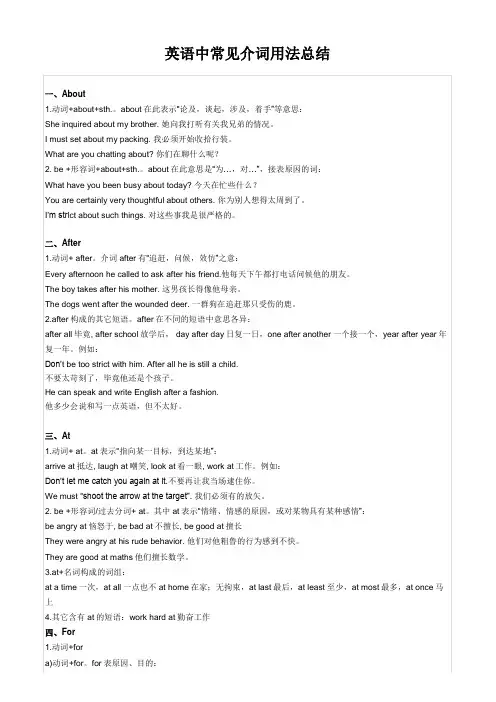
英语中常见介词用法总结answer for对…负责look for寻找, prepare for为…作准备例如:He is prepare for the coming English test. 他为即将到来的英语考试做准备。
He who would look for pearls must dive below.要想找到珍珠,必须潜到海底。
b)动词+sb.+ for +sth.。
for表示原因或目的:ask for要求得到, pay for花钱买thank for对…表示谢意。
例如:thanks for your help. 谢谢你的帮助。
2. be +形容词+for。
for表作用、目的、对人或物有某种情绪等:be bad for有害于be good for利于, be famous for以…出名be late for迟到, be sorry for为…而后悔be useful for对…有作用。
例如:He is famous for his great talent. 因伟大的天赋而出名。
3.for+名词构成的词组:for ever永远,for example例如, for free免费,for fun为了好玩, for oneself替自己,4.动词+副词/名词+for构成的短语:have a gift for有某方面的天赋。
五、From1. 动词+froma)动词+ from。
from表示“来源、原因、起始”等:come from来自,date from追溯, die from死于, hear from收到来信,learn from向某人学习例如:she comes from China.b)动词+ sth./sb. +from + sth./ sb. /a place。
from表示“来源、免于”等:keep from阻止做 stop from阻止。
例如:Stop the child from crying.2. be +形容词+ from。
介词及短语知识点总结
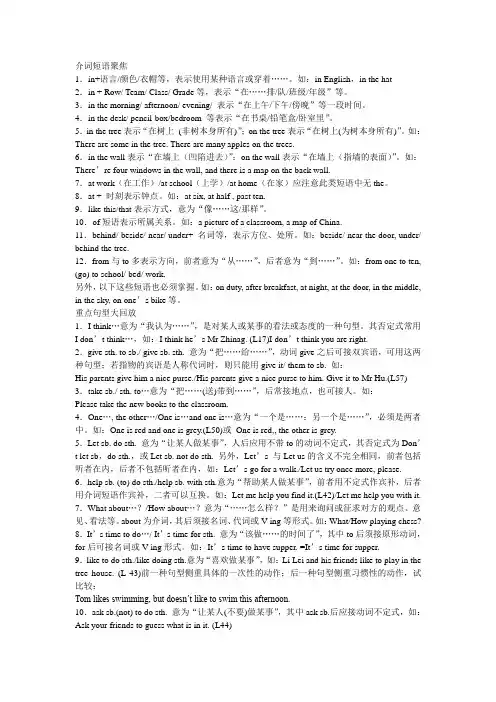
介词短语聚焦1.in+语言/颜色/衣帽等,表示使用某种语言或穿着……。
如:in English,in the hat2.in + Row/ Team/ Class/ Grade等,表示“在……排/队/班级/年级”等。
3.in the morning/ afternoon/ evening/ 表示“在上午/下午/傍晚”等一段时间。
4.in the desk/ pencil-box/bedroom 等表示“在书桌/铅笔盒/卧室里”。
5.in the tree表示“在树上(非树本身所有)”;on the tree表示“在树上(为树本身所有)”。
如:There are some in the tree. There are many apples on the trees.6.in the wall表示“在墙上(凹陷进去)”;on the wall表示“在墙上(指墙的表面)”。
如:There’re four windows in the wall, and there is a map on the back wall.7.at work(在工作)/at school(上学)/at home(在家)应注意此类短语中无the。
8.at + 时刻表示钟点。
如:at six, at half , past ten.9.like this/that表示方式,意为“像……这/那样”。
10.of短语表示所属关系。
如:a picture of a classroom, a map of China.11.behind/ beside/ near/ under+ 名词等,表示方位、处所。
如:beside/ near the door, under/ behind the tree.12.from与to多表示方向,前者意为“从……”,后者意为“到……”。
如:from one to ten, (go) to school/ bed/ work.另外,以下这些短语也必须掌握。
介词用法总结
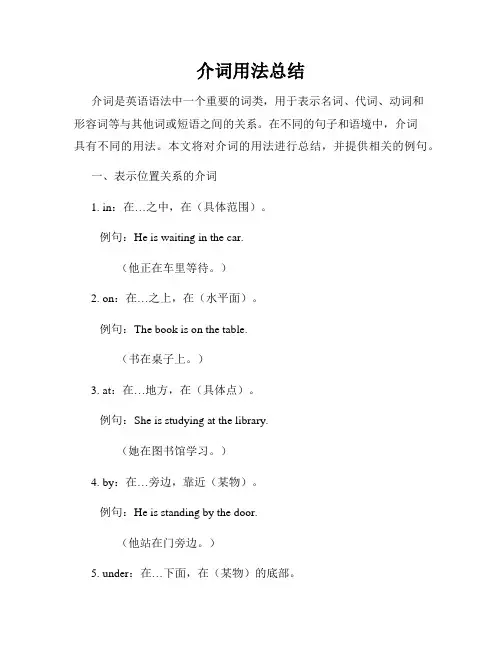
介词用法总结介词是英语语法中一个重要的词类,用于表示名词、代词、动词和形容词等与其他词或短语之间的关系。
在不同的句子和语境中,介词具有不同的用法。
本文将对介词的用法进行总结,并提供相关的例句。
一、表示位置关系的介词1. in:在…之中,在(具体范围)。
例句:He is waiting in the car.(他正在车里等待。
)2. on:在…之上,在(水平面)。
例句:The book is on the table.(书在桌子上。
)3. at:在…地方,在(具体点)。
例句:She is studying at the library.(她在图书馆学习。
)4. by:在…旁边,靠近(某物)。
例句:He is standing by the door.(他站在门旁边。
)5. under:在…下面,在(某物)的底部。
例句:The cat is hiding under the bed.(猫在床下躲藏。
)6. between:在…之间(两者之间)。
例句:The restaurant is located between the bank and the supermarket.(这家餐厅位于银行和超市之间。
)二、表示时间关系的介词1. at:在(具体时间点)。
例句:She will meet her friend at 8 o'clock.(她将在8点钟见她的朋友。
)2. on:在(具体日期或星期)。
例句:I have a meeting on Monday.(星期一我有个会议。
)3. in:在(一段时间内)。
例句:He will travel to Europe in summer.(他将在夏天去欧洲旅行。
)4. during:在…期间,表示全程。
例句:I read a book during the flight.(我在飞行途中读了一本书。
)5. for:持续时间,表示时间段。
例句:They have been married for ten years.(他们已经结婚十年了。
史上超全的英语介词用法归纳总结!不看太可惜了
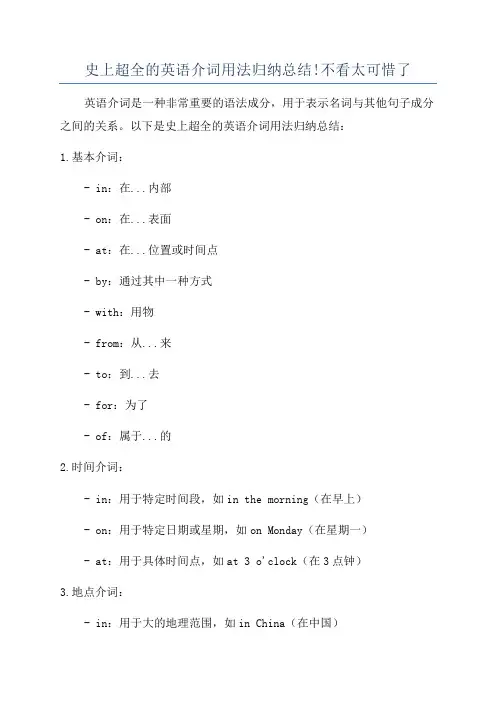
史上超全的英语介词用法归纳总结!不看太可惜了英语介词是一种非常重要的语法成分,用于表示名词与其他句子成分之间的关系。
以下是史上超全的英语介词用法归纳总结:1.基本介词:- in:在...内部- on:在...表面- at:在...位置或时间点- by:通过其中一种方式- with:用物- from:从...来- to:到...去- for:为了- of:属于...的2.时间介词:- in:用于特定时间段,如in the morning(在早上)- on:用于特定日期或星期,如on Monday(在星期一)- at:用于具体时间点,如at 3 o'clock(在3点钟)3.地点介词:- in:用于大的地理范围,如in China(在中国)- on:用于较小的地理范围或表面,如on the street(在街上)- at:用于具体地点,如at the supermarket(在超市)4.方向介词:- to:表示到达一些地方,如go to school(去学校)- into:表示进入一些地方,如go into the house(进入房子)- out of:表示离开一些地方,如get out of the car(离开车)5.原因介词:- because of:由于,如He is late because of the traffic(他因为交通堵塞而迟到)- due to:由于,如The flight was canceled due to bad weather(因为恶劣天气,航班被取消)6.动词短语介词:- look after:照顾,如She looks after her younger brother (她照顾她的弟弟)- take care of:照顾,如He takes care of his plants(他照顾他的植物)7.形容词短语介词:- interested in:对...感兴趣,如She is interested in music (她对音乐感兴趣)- good at:擅长...,如He is good at playing basketball(他擅长打篮球)8.其他常见介词用法:- with regard to:关于,如With regard to the matter, I have something to say(关于这件事,我有些话要说)- instead of:代替,如I will go instead of him(我将代替他去)- according to:根据,如According to the weather forecast, it will rain tomorrow(根据天气预报,明天会下雨)以上是一些常见的英语介词用法总结,希望能帮到你!。
100个常用介词短语
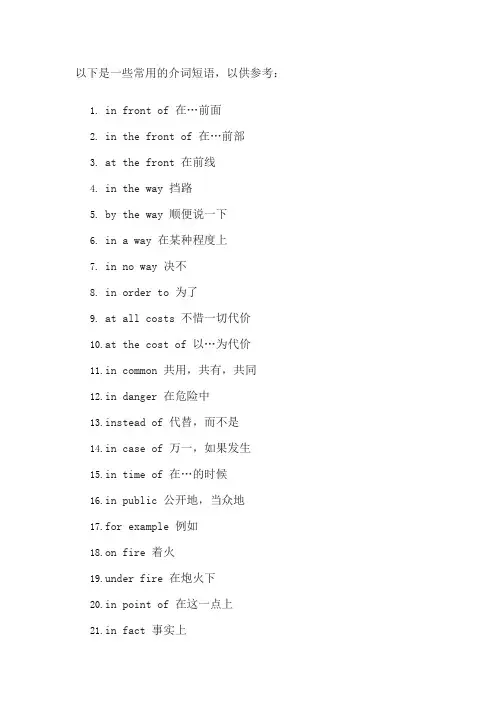
以下是一些常用的介词短语,以供参考:1.in front of 在…前面2.in the front of 在…前部3.at the front 在前线4.in the way 挡路5.by the way 顺便说一下6.in a way 在某种程度上7.in no way 决不8.in order to 为了9.at all costs 不惜一切代价10.at the cost of 以…为代价11.in common 共用,共有,共同12.in danger 在危险中13.instead of 代替,而不是14.in case of 万一,如果发生15.in time of 在…的时候16.in public 公开地,当众地17.for example 例如18.on fire 着火19.under fire 在炮火下20.in point of 在这一点上21.in fact 事实上22.for instance 例如23.at once 马上,立刻24.in love 在恋爱中25.in peace 和平地,安静地26.at peace 处于和平状态27.on purpose 故意,有意地28.by accident 偶然地,意外地29.in case 万一,如果发生30.on business 因公出差31.at first 首先,最初32.at last 最后,终于33.at least 至少,最低限度34.at most 至多,不超过35.at noon 在中午,在顶点36.at night 在夜晚,在傍晚37.all night 整夜,彻夜未眠38.by night 在夜晚,在晚上39.in the distance 在远处,在远方40.here and there 到处,处处,东一个西一个地41.in use 在使用中42.in vain 徒劳,无效43.in no time 马上,立即44.in general 一般来说,大体上45.in detail 详细地46.at all times 随时,总是47.at intervals 时时,不定时地48.at length 最后,终于49.at last 最后,终于50.at the expense of 由…付费,由…负担费用51.at will 随意,任意52.by turns 轮流,交替53.in turn 依次,轮流54.in respect of 关于,就…方面来说55.at random 随意地,任意地56.on purpose 故意地,特意地57.on business 出差办事58.instead of 代替,而不是59.in time to 及时赶到60.in return 作为回报61.according to 根据,按照62.in front of 在…前面63.in spite of 尽管64.by the way 顺便说说65.in the end 最后,终于66.at the same time 同时67.at hand 在手边,在附近68.from time to time 有时,不时69.in the future 在将来70.on time 准时71.at a time 每次,依次72.all the time 一直,始终73.at intervals 时时,不定时地74.for the time being 暂时,目前75.at the moment 此刻,目前76.by the way 顺便提一下77.in a hurry 匆忙地,急于78.in secret 秘密地,私下地79.in the least 一点,丝毫80.in no case 无论如何不,决不81.in no time 立即,马上82.in all probability 很可能,多半83.in this case 既然这样,那就84.in time 及时地85.in general 一般地,大体上86.in such a way 这样87.in return 作为回报、回应88.in the direction of 向…方向去89.in advance 预先、事先90.in the end 最后、终于91.on purpose 故意地、有目的地92.at ease 安逸、自由自在、放松93.at present 目前、现在94.at hand 在手边、在附近95.in use 在使用中、被使用96.at least 至少、最低限度97.at most 至多、不超过98.by oneself 靠自己、独自地99.in turn 依次、轮流、转而、反过来100.in order to 为了。
常用介词构成的短语
常用介词构成的短语介词虽然不能单独作为句子的成分,但由介词和介词宾语构成的介词短语却可以做多种句子成分。
(1)常与介词与about连用的短语care about 关心hear about听说look about 四处看learn about了解talk about谈论think about考虑,思考worry about 担心;焦虑(2)常与介词at 连用的短语①at + 名词at noon 在中午at night 在晚上at times有时at breakfast/ at lunch /at dinner在吃早餐、午餐、晚餐at present 目前,现在at table 在吃饭at college/ at university在上大学at home/ at school/ at work在家、在上学、在上班②动词+ atlook at看point at指向,指示knock at敲(门、窗等)shout at 冲……嚷嚷laugh at 嘲笑call at拜访arrive at 到达(小地方)③be + 形容词+ atbe good at 擅长于….. be bad at 不善于…. be mad at 对….发怒be amazed at/ be surprised at 对….感到惊讶④其他常用短语at first最初,起先at last最后at most最多at least 至少at the moment 此刻,现在at the age of在….岁时at the doctor’s 在医生诊所not ….at all 一点儿也不,根本不at the beginning of 在….开始时at that time 那时at the end of 在…结束时,在….的末端(尽头)(3)常与介词for连用的短语①for + 名词for fun为了娱乐;开玩笑地for example/for instance 举例,例如②动词+ forask for请求,要求wait for等候,等待care for 关心,喜欢search for 查stand for代表,表示look for寻找play for为…..效力leave for 动身前往pay for付款send for派人去请,召唤be for赞成,支持providesth. for sb把某物提供给某人= provide sb. withsth.③be + 形容词+ forbe late for因….而迟到be famous for/ be well-known for 因….为闻名be good for对…有益be bad for对…有害be anxious for 盼望,渴望be fit for 适合,合适be suitable for 对…合适(适宜) be ready for为…做准备be sorry for因…而抱歉/难过be thankful for因…而感激be used for 被用于….(4) 常与介词from 连用的短语①动词+ fromhear from收到….的来信die from 因…而死keep/stop/prevent….from阻止做…. learn from向…..学习be/come from来自borrow …..from 向…..借②be + 形容词+ frombe absent from缺席be different from 与…..不同be far from 离….远be away from远离….. be made from由….制成(看不出原材料)③其他常用短语across from 在….对面from time to time 不时地from beginning to end 从头到尾from door to door挨家挨户(5)常与介词in 连用的短语①in + 名词in danger 处于危险中in trouble 处于困境中,处于麻烦中in a low voice低声地in a hurry 匆忙地in English用英语in bed躺在床上②动词+ ingive in 屈服,让步join in参加fill in 填写hand in 上交succeed in 在….方面获得成功arrive in到达(大地方) believe in相信, 信任take pride in以….为自豪(骄傲)③be + 形容词+ inbe interested in对….感兴趣be weak in在….方面弱be strict in 对(某事)要求严格be strict with 对(某人)要求严格be experienced in 在….方面有经验be honest in在….方面诚实(6)常与介词of 连用的短语①动词+ ofthink of考虑, 想到talk of谈到complain of 抱怨hear of 听说,听到dream of 梦到die of 死于….②be + 形容词+ ofbe afraid of害怕, 恐惧be careful of 小心,注意be fond of 喜欢be full of充满….. be proud of 为….而自豪(骄傲) be sure of 确定, 对…有把握be made of 由…制成(能看出原材料)be tired of 对…感到厌烦be glad of 为….而高兴be short of 缺乏, 短缺③其他常用短语all kind of 各种各样的a lot of/ lots of 许多,大量a pair of 一双/一对/一副take care of照看,照顾at the beginning of 在….开始时instead of 代替, 而不是take photos of 给….拍照make fun of 取笑run out of用完,用尽because of 因为,由于at the end of 在…结束时; 在….的尽头remind sb. of sth.提醒某人想起某事(7) 常与介词on 连用的短语①on + 名词on sale 廉价出售on duty值日,值班on earth 究竟,到底on fire 着火on foot 步行on holiday/ vacation度假on one’s way to….在某人去…….的路上②动词+ oncall on拜访(某人) go on继续depend on 依赖,取决于keep on继续carry on 实施,执行put on 穿, 戴(衣,鞋,帽等) live on以….为生turn on/ switch接通电源,打开work on 操作move on 继续移动spend on 在….上花钱或时间等try on 试穿(戴) pass on传递feed on 以…为食(8)常与介词to 连用的短语①动词+ tolisten to 听….. get to到达agree to同意,接受(计划,方案等) belong to属于reply to 回答,答复write to写信给… add to 增加,添加happen to 碰巧,; 发生(在某人身上) lead to 导致; 通向②be + 形容词/过去分词+ tobe used to doing sth习惯于做某事be useful to 对…有用be close to 接近; 靠近be familiar to为(某人)所熟悉be important to 对….重要be necessary to 对… 有必要be supposed to应该; 被期望be similar to 与…相似be married to 嫁给…; 与….结婚be good to do sth对做…有好处be bad to do sth对做…有坏处③其他常用短语thanks to幸亏;由于pay attention to 注意;重视look forward to盼望;期望to one’s surprise 令某人惊讶的是help oneself to 随意吃…. prefer A to B喜欢A胜过B (9)常与介词with连用的短语①动词+ withagree with sb. 同意某人(的观点,意见等) play with 玩弄…. begin with 以….开始end with 以…结束come up with 想出;提出catch up with 跟上; 赶上deal with对付;处理do with处理;需要get on with/ get along with 与….相处provide sb. with sth.为某人提供某物②动词+ sb. / sth. + with + sb./ sth.make friends with 与…交朋友be strict with 对(某人)要求严格be popular with 受到…的喜爱(欢迎) be angry with对(某人)生气be pleased with对…感到高兴(满意) be satisfied with对…满意(10) of sb. 与for sb.of sb. 对于(某人),用于It is + 形容词+ of sb. to do sth句型中,形容词为kind, nice, clever, friendly 等描述任务的性格特征的词。
常用介词短语及动词短语总结
常用介词短语及动词短语总结————————————————————————————————作者:————————————————————————————————日期:常见的介词搭配1.“介词+名词”型(1) in +名词in advance 在前头,事先,预先in case 如果,万一in charge 主管,掌管,看管in common 共有,共同,公有in demand 有需要的in doubt 感到疑惑的,难以确定的in effect 实际上,生效in fact 事实上in order 按序,井然有序,情况良好;恰当in progress 进行中in return 作为回报in turn 依次,替换地;相应地,转而in vain 徒劳(2) on+名词on guard 在值勤on leave 在休假on holiday 在度假on strike 罢工on sale 出售on loan 借贷on+the+名词on the move 在移动,搬迁;离开on the march 在行军on the flow 在涨潮on the increase 正在增加on the go 正在活动,正在奔走on the air 正在广播on the fly 正在飞行(3) beyond +名词beyond one's power 是某人力所不及的beyond praise 夸不胜夸beyond one's reach 够不着beyond description 难以形容beyond words 无法用语言形容beyond doubt 无疑beyond one's understanding 无法理解(4) under +名词under development 在发展中under observation 在观察中under test 在测试中under construction 在建设中under examination 在检查(调查)中under consideration 在考虑中under repair 在修理中(5) at +名词at length 详细地,长时间at sea 茫然at will 任意地at work 在上班at lunch 在吃午饭at rest 在休息at table 在吃饭at school 上学at church 做礼拜at peace 处于和平状态(6) out of +名词out of breath 上气不接下气out of balance 失去平衡out of date 过时out of patience 不耐烦out of control 失去控制out of business 破产out of style 过时,不时髦out of the ordinary 不寻常的out of touch 失去联系2.复杂介词型(1) 表示原因(通常在句中作状语), 意为“由于,因为”。
英语中常见介词构成的短语(优秀10篇)
英语中常见介词构成的短语(优秀10篇)(经典版)编制人:__________________审核人:__________________审批人:__________________编制单位:__________________编制时间:____年____月____日序言下载提示:该文档是本店铺精心编制而成的,希望大家下载后,能够帮助大家解决实际问题。
文档下载后可定制修改,请根据实际需要进行调整和使用,谢谢!并且,本店铺为大家提供各种类型的经典范文,如总结报告、合同协议、规章制度、条据文书、策划方案、心得体会、演讲致辞、教学资料、作文大全、其他范文等等,想了解不同范文格式和写法,敬请关注!Download tips: This document is carefully compiled by this editor. I hope that after you download it, it can help you solve practical problems. The document can be customized and modified after downloading, please adjust and use it according to actual needs, thank you!Moreover, our store provides various types of classic sample essays, such as summary reports, contract agreements, rules and regulations, doctrinal documents, planning plans, insights, speeches, teaching materials, complete essays, and other sample essays. If you want to learn about different sample formats and writing methods, please pay attention!英语中常见介词构成的短语(优秀10篇)短语是连通句子的桥梁,学习英语基础是要掌握短语的运用,本店铺精心为您带来了英语中常见介词构成的短语(优秀10篇)在大家参照的同时,也可以分享一下本店铺给您最好的朋友。
高中英语《常用的介词短语》积累
常用的介词短语1.above构成的惯用短语above all 尤其是,最重要的是above praise 赞美不尽above price 价值连城above one’s income入不敷出above the average 超过一般水平2.after构成的惯用短语after all 毕竟,到底day after day 日复一日one after another 接二连三year after year 年年岁岁3. at构成的惯用短语at the sight of 看到at peace 处于和平状态,心情平静at one’s ease/ at one’s leisure在闲暇时at the thought of 想到at home 安适, 在家at one’s convenience 在某人方便时at the end of在…结尾,在…末端at a loss = at sea 迷茫at random 随意地at dusk 黄昏at one’s mercy任人支配,有人摆布at one’s service乐意帮助at hand 在身边at least 至少at the risk of 冒险at the point of 就要, 刚要做…at half price of 半价at any rate 至少,无论如何at most 至多at a loss 亏本at a bargain 廉价4. beyond构成的惯用短语beyond words 难以言喻beyond control 难以控制beyond belief 难以置信beyond description 难以描述5.by构成的惯用短语by rule 按规则by way of 经由year by year 年复一年by force 用武力by heart 熟记step by step 逐步little by little 渐渐地by chance 偶然by post 邮寄by mistake 弄错by accident 偶然,意外地by means of 用…方法by all means 用一切手段,当然可以by turns 轮流6. for构成的惯用短语for the moment 暂时answer for 负责for life 终生7.from构成的惯用短语from now on 从现在起from morning till night 从早到晚8.in构成的惯用短语in whispers 低语in a good mood 心情好in high spirits 情绪高昂in hope 在希望中in despair 失望in trouble 处于困境in pain 在痛苦中in need 在危急中in debt 负债in good condition 情况良好in one’s way妨碍in the air 传播in love 恋爱in ruins 荒废in secret 秘密地in shape 在外形上in bloom 盛开in memory of 纪念…in reward of 作为…的报酬in safety 安全地in good order 秩序良好in black and white 白纸黑字in good health 健康in a fever 发烧in touch 联系in public 公开地in use 在使用中in doubt 怀疑in search of 寻求in honour of 对…表示敬意in favour of 赞成in brief 简单地说in addition 另外in other words 换言之in fact 事实上in general 一般来说lie in 在于in turn 依次in support of 支持in vain 徒劳in terms of 用…的术语,根据in no time 马上in the open air 在露天in all 总计in time 及时be engaged in 从事于be absorbed in 专心于9.on构成的惯用短语on duty 值班on holiday 度假on leave 休假on the way 在途中on strike 罢工on display / show 展示on fire 失火on trial 受审on the watch 警戒,注意on condition that 在…条件下have effect on 对…有影响on purpose 故意on the contrary 相反的on the average 平均on behalf of 代表on the one hand …on the other hand 一方面…另一方面10.out of构成的惯用短语out of patience 不耐烦out of danger 脱险out of sight 看不见out of fashion 不流行out of place 不恰当out of breath 上气不接下气out of date 过时out of control 失去控制out of work 失业11.to构成的惯用短语according to 根据due to 由于to one’s benefit对…有益compare to 对比to one’s face当某人的面as to 关于,至于to and fro 来回地be frozen to death 冻死to one’s joy使人快乐be used to doing…习惯做…to one’s shame使人丢脸to one’s disappointment使人失望to one’s satisfaction使人满意attached to 附属be accustomed to 习惯于in addition to 除…之外look forward to…盼望…12.under构成的惯用短语under consideration 在考虑中under the leadership of…在…的领导下under control 在控制之下under construction 在建设中13.with构成的惯用短语in connection with 与…相连in touch with 与…接触in contact with 与…有联系with a firm hand 坚决地in harmony with 与…协调。
- 1、下载文档前请自行甄别文档内容的完整性,平台不提供额外的编辑、内容补充、找答案等附加服务。
- 2、"仅部分预览"的文档,不可在线预览部分如存在完整性等问题,可反馈申请退款(可完整预览的文档不适用该条件!)。
- 3、如文档侵犯您的权益,请联系客服反馈,我们会尽快为您处理(人工客服工作时间:9:00-18:30)。
常用介词短语总结一、近义介词短语辨析1. 表示原因(通常在句中作状语)1) because of:表示实际原因(表达一种较强的因果关系)2) on account of:常用来引述逻辑、理性和事实因素3) out of + 抽象名词:常用来引述心理、情感因素,如out of one’s own will(出于自愿)4) owing / due to:着重把原因归于某事物,既可作状语又可作定语,due to还可以作后置定语,如:Mistakes due to carelessness may cause serious consequence. 由于粗心犯的错误也许会引起严重的后果。
5) thanks to:后面通常接表示积极意义的原因,意为"多亏,幸亏由于"。
例句:He walked slowly because of his bad leg. 他腿不好,所以走得很慢。
Michel and Billy, on account of their wide experiences in climbing, were voted leaders. 迈克尔与贝利由于有丰富的登山经验,被选为队长。
She did it out of sympathy. 她这样做是出于同情。
Most of the problems were owing/due to human errors. 大部分问题都是由于人为的错误造成的。
Thanks to your energy and intelligence, the development scheme has been finally realized. 多亏了你的精力和智慧,这项发展计划终于实现了。
2. 表示排除1) with the exception of意义与except, except for相同,但比它们正式2) apart from (=美式英语中的aside from)是个复合介词,既可表示"除……之外",相当于except (for), 又可以表示"除……之外,(还,也)"相当于besides。
例句: They all passed the physics examination with the exception of Tom. 除汤姆外他们物理考试都及格了。
We had a smooth journey apart from(= except for) a flat tyre. 我们一路上很顺利,只是车胎漏了一次气。
Apart from(= besides) a flat tyre, we had broken brakes. 我们不但车胎漏了气,而且刹车也出了毛病。
3.表示"有关,关于"4.1) 表示"关于"的介词:concerning(较为正式),respecting(关于,至于),regarding(关于,就……而论,在……方面)等5.He quarreled with his neighbor concerning the house. 他因房子问题和邻居发生了争吵。
6.I’m at a loss respecting his whereabouts. 我全然不知道他的踪迹。
7.Regarding the punishment, what would you advise?8.就这种处罚来说,你有什么意见?9.2)表示"关于"的介词短语:with respect to(关于,就……而言);in respect of(就……而论,在……方面);in / with regard to, in / with reference to, in connection with也都表示"(正式用语)关于,有关";as for和as to在用于句首表示"至于"时区别不大,可以互相通用,但as to表示"关于"时不能和as for互换,相当于about和concerning。
4. 表示"在……之前"1) ahead of意为in advance of,可表示"(在空间或时间上比某人或某事物)更前,更早";还可表示"领先,优于"2) in front of 多指空间的前后关系,"在……正前方"3) prior to(正式用语)指时间与重要性方面"在……之前"4) previous to指时间与顺序上在……前5) preparatory to意为in readiness for, as a preparation for, 为做准备而在……之前6) on the eve of "在……前夕",如:on the eve of our examination / victory 在我们考试/胜利的前夕例句:5. 表示"支持,赞成"1) in support of 维护,支持,支援Mr. Smith spoke in support of the motion. 史密斯先生发言支持这项提议。
2) in favor of 可指某人"支持,赞成",也可指事物"有利于……"Are you in favor of the proposal? 你赞成此建议吗?The exchange rate is in our favor.兑换率有利于我们。
6. 表示"鉴于,由于;根据,按照"1)in the light of 按照,考虑到He rewrote the book in the light of further research. 考虑到进一步的研究,他重写了那部书。
2)in terms of 就……而言,谈到The job is great in terms of salary, but it has its disadvantages. 就薪水而言,这是份好工作。
但它也有不足之处。
3)on the grounds of; on ... grounds 以……为理由/根据Their request for a permission to open a mine was denied on environmental grounds. 基于对环境问题的考虑,他们开矿的请求没有被许可。
4)in accordance with 与……一致,书面语5)according to 根据;按照A diplomat must act according to circumstances. 外交官必须会随机应变。
(二)形近义异介词短语辨析1. ①all but 几乎,差一点(almost);除了……都(all except)②an ything but单单除……之外;根本不……③nothing but 仅仅,只不过(only, no more than)I all but stumbled. 我差一点摔跤。
I will eat anything but carrot. 我什么都吃,就是不吃胡萝卜。
He is anything but clever. 他根本不聪明。
The fellow is nothing but a fool. 那家伙不过是个傻瓜而已。
2. ①at a time 每次,一次②at one time曾经,一度(once);同时(at the same time; simultaneously)He used to abandon his work for many months at a time. 他过去常常把工作一丢就是好几个月。
At one time she was the chairman of the board. 她曾担任董事会主席。
He was the chairman of the board and at one time he was also the president of the company. 他同时担任董事会主席和公司总裁。
3. ①at no time决不,从不(never; on no occasion)②in no time立即,马上(in a very brief time)At no time did I feel they were being unreasonable. 我从没觉得他们不讲理。
We’ll be there in no time.我们很快就会到那儿。
4. ①for the moment暂时(as far as the present time is concerned, although perhaps not later)②at the moment此刻,现在(at present time; now)③in a moment很快,一会儿(very soon)For the moment we are content to watch and wait.目前我们甘心在一旁观察和等待。
(暗含以后不甘于这样的意味)I’m busy at the moment, but I’ll do it later. 这会儿我很忙,过后我会处理这件事的。
I am on the telephone now, but I will be with you in a moment. 我正打电话,一会儿就到你那儿去。
5. ①at present目前,现在(at the present time or moment; now)②for the present暂时,暂且(temporarily);就目前而言(as far as the present time is concerned意指某一情形目前存在着,但很可能会发生变化)We don’t know at present who will win the election.现在我们还不知道谁将在选举中获胜。
For the present she continues with the antibiotics. 目前她还是继续使用抗生素。
6. ①out of question毫无疑问(without doubt; doubtless),作表语②out of the question不可能的(not to be thought of as possible; not to be done),也作表语③without question毫无疑问,毫无疑义(without arguing or asking why it is necessary),作状语The sabotage is out of question a fresh blow to international peace efforts. 那次阴谋破坏无疑对国际和平努力又是一个新的打击。
